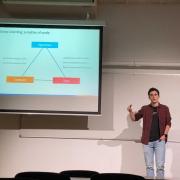PhD thesis defense: Víctor Campos (Dec 22nd, 2020)
 |
Víctor Campos, defends his PhD thesis entitled Deep Learning that Scales: Leveraging Compute and Data Tuesday December 22nd, 14h, Videoconference (*) (*) UPC members may use this link. |
The evaluation committee will be composed by Oriol Vinyals (Deepmind), Ferran Marqués (UPC) and Joan Serrà (Dolby Labs).
Dissertation summary:
Deep learning has revolutionized the field of artificial intelligence in the past decade. Although the development of these techniques spans over several years, the recent advent of deep learning is explained by an increased availability of data and compute that have unlocked the potential of deep neural networks. They have become ubiquitous in domains such as natural language processing, computer vision, speech processing, and control, where enough training data is available. Recent years have seen continuous progress driven by ever-growing neural networks that benefited from large amounts of data and computing power.
This thesis is motivated by the observation that scale is one of the key factors driving progress in deep learning research, and aims at devising deep learning methods that scale gracefully with the available data and compute. We narrow down this scope into two main research directions. The first of them is concerned with designing hardware-aware methods which can make the most of the computing resources in current high performance computing facilities. We then study bottlenecks preventing existing methods from scaling up as more data becomes available, providing solutions that contribute towards enabling training of more complex models.
This dissertation studies the aforementioned research questions for two different learning paradigms, each with its own algorithmic and computational characteristics. The first part of this thesis studies the paradigm where the model needs to learn from a collection of examples, extracting as much information as possible from the given data. The second part is concerned with training agents that learn by interacting with a simulated environment, which introduces unique challenges such as efficient exploration and simulation.

